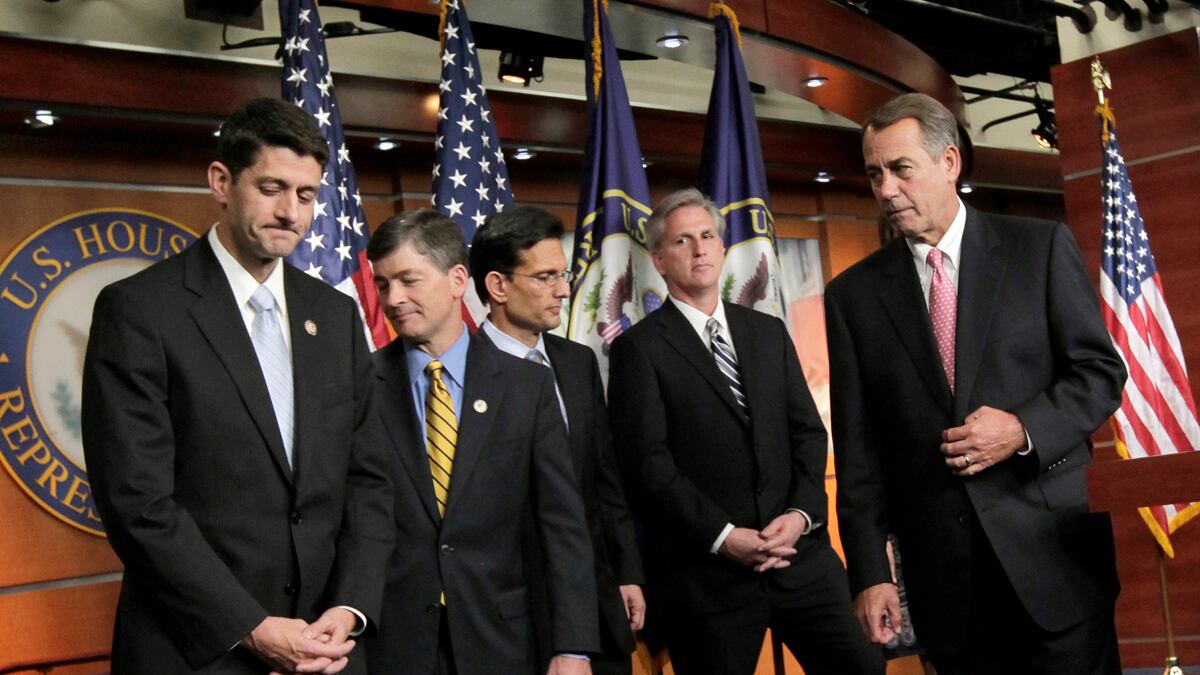In a cliffhanger vote that took Congress halfway to saving America from defaulting on its debts, the House on Monday evening comfortably approved a deal to cut spending and raise the nation’s borrowing limit.
Scores of House members on the right and the left were angry and frustrated by the compromise plan struck between congressional leaders and the White House. One Democrat, Emanuel Cleaver of Missouri, even derided the deal as a “sugar-coated Satan sandwich."
But in the end, many from both parties rallied late in the day to offer support, from Tea Party favorites like Reps. Renee Ellmers (R-NC) and Allen West (R-FL) to House Minority Leader Nancy Pelosi. And the House passed the bill 269–161 with 95 Democrats joining majority Republicans.
And in a moment of surprise that pierced through the months of bickering, Rep. Gabrielle Giffords (D-AZ) entered the House floor to applause as she unexpectedly appeared for the vote, her first showing in the chamber since she was shot in January in Tucson by a would-be assassin.
The final episode of the months-long debt saga is scheduled to play out Tuesday, when the Senate is expected to pass the agreement and send it to President Obama for his signature. As usual, Congress was cutting it closer than close: The administration said the nation would hit its borrowing limit on Tuesday.
Passage by Congress would avert a financial disaster in which the administration predicted the nation could default on its bills.
The votes were preceded by a frenzied sales effort by leaders in both parties, who acknowledged that the plan wasn’t perfect but maintained it was the best possible solution given the impending deadline. The compromise would cut spending by about $1 trillion immediately and name a special committee of Congress to identify $1.5 trillion in additional deficit reduction by the end of the year. It would also raise the nation’s borrowing limit in stages through early 2013.
Hours before the vote, the Congressional Budget Office estimated that the package would cut the deficit between $2.1 trillion and $2.3 trillion, somewhat less than expected when the package was announced Sunday night.
White House Press Secretary Jay Carney sold the package to skeptical reporters as a win for all sides. “The deal negotiated with the leaders of Congress is a victory for the American people,” he said to some groans from the press corps, sensing the White House spinning a win out of an episode in which it made substantial concessions.

To quell those anxieties, Vice President Joe Biden made a last-minute trip to Capitol Hill on Monday afternoon to meet with the Democratic caucuses of both chambers. He got an earful from liberal Democrats who saw the deal as a capitulation to the Tea Party wing of the Republican Party, which demanded deep cuts with no increases in taxes.
Pelosi derided the deal earlier Monday as a “bill that makes these big cuts and has not one red cent from the wealthiest people in our country.” But she ultimately decided to vote for the bill for the good of the country, to avoid a default, she explained to her colleagues in a House floor speech
“We got the best we could,” Biden told a House meeting, according to one Democratic member sticking to the traditional rules of not talking openly about what happens in closed meetings. Biden also mentioned a few components that would be good for Democrats later, like the expiration of the Bush tax cuts at the end of 2012, which will bring in trillions in new revenue. Revenue increases were also possible through an elite joint committee of 12 members tasked with finding another $1.5 trillion in cuts over the next few months.
The president and other Democrats insist everything is on the table in the second phase of cuts, including tax increases and entitlement programs. Republicans said they planned to hold the line on no new taxes. The bickering signaled that partisanship would continue into the fall on the issue of debt and spending.
But despite making the hard sell, Biden’s visit was mostly a courtesy call in the eyes of several members, showing respect for those who would soon have to take a tough vote imposing painful cuts to government programs.
“There’s no question he’ll get the votes. If the president and Senate majority leader and House minority leader support it, they’ll get the votes they need. If they need a few more, they’ll make some calls, but they’ll get there,” said Rep. Brad Sherman, a senior Democrat from California who, when he spoke with Newsweek and The Daily Beast, was still reading the bill. (He said he’d most likely support it—a common refrain among most Democratic members keeping their cards close to the vest before Monday evening's vote.)
Even at the end, drama reigned. During a 15-minute House vote that played out on live TV, Democrats withheld their votes until the end to see how many Republicans would vote for the plan, intent on providing only enough votes to ensure passage but no more. The strategy allowed the largest number of Democrats to register their distaste with a “no” vote.
With both parties willing to sign on to the deal, only about half of each caucus had to vote yes. Yet in the hours before the final vote, several constituencies still held back. “I’m not going to vote for this, because it doesn’t go far enough,” Rep. Joe Walsh (R-IL), one of about 30 freshman Tea Party members who drove much of the debate, said Monday. “I said I’d only agree if there was a balanced-budget amendment included, which there isn’t.” The final agreement requires only a vote on an amendment, which is unlikely to pass considering the current legislative calculus.
Another holdout group: Pentagon supporters. Under the formal deal, a powerful trigger would kick in beginning in 2013 if the special committee couldn’t agree on the second round of cuts. The trigger would cut about $600 billion directly from the Pentagon’s budget, leaving some in the defense community feeling blindsided and the victims of compromise.
While much of Capitol Hill was feeling a degree of relief, a group of about a half-dozen lobbyists for defense contractors filled one elevator, all silent and looking as if they clearly had their work cut out for them.
Here are the highlights of the deal:
• Increase the debt limit in three stages: $400 billion immediately; another $500 billion this fall; and a third installment of between $1.2 trillion and $1.5 trillion next year, after lawmakers enact matching spending cuts.
• Immediately cut more than $900 billion over 10 years in discretionary federal spending, and cap such spending at $1.043 trillion in 2012 and about the same in 2013. After that, discretionary spending would be capped at 2 percent growth per year.
• Create a 12-person special congressional committee, evenly divided between Republicans and Democrats, that would be responsible with producing up to $1.5 trillion more in deficit cuts over 10 years. If those cuts aren’t settled on or approved by Congress, automatic spending cuts would be enacted.
• Require a vote in Congress on a balanced-budget amendment to the Constitution.
• Protect recent funding increases for Pell Grants for low-income college students.







